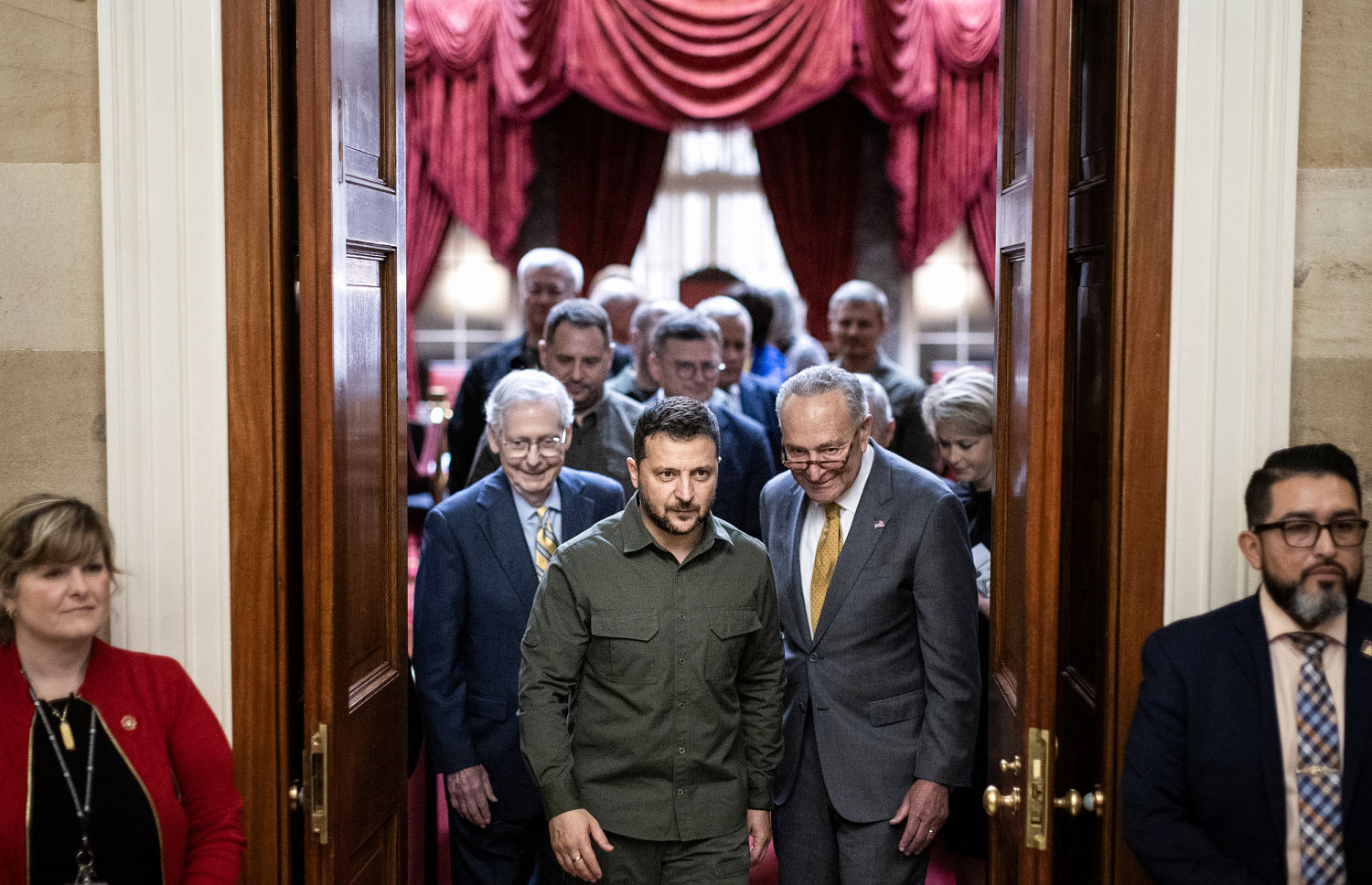WASHINGTON — A growing Republican divide over continuing U.S. aid to Ukraine threatens the prospects of Congress’ passing additional money to help the country defend its sovereignty against a Russian incursion.
Despite the broad bipartisan majorities in the House and the Senate to continue funding, it has become a central sticking point in the fight over a looming government shutdown. And hopes are dimming in the GOP-controlled House, where Speaker Kevin McCarthy, R-Calif., faces growing pressure from hard-liners who want to cut off Ukraine aid as they threaten to overthrow him if he fails to meet their demands.
An amendment to the defense funding bill by Rep. Matt Gaetz, R-Fla., to prohibit all military assistance to Ukraine won 93 Republican votes Wednesday, as 126 Republicans and all 213 Democrats voted against it. That’s up from 70 Republicans who voted for a similar measure by Gaetz in July.
A separate amendment by Rep. Andy Biggs, R-Ariz., to slash $300 million in arms assistance for Ukraine — an allocation that has been the status quo since Russia’s illegal annexation of Crimea in 2014 — got 104 GOP votes, with 117 Republicans joining 213 Democrats to vote it down.
Both amendments failed in lopsided votes, but the GOP opponents succeeded in getting leadership to strip out the Ukraine funding and try to pass it as a separate bill anyway. Their resistance points to a growing populism within the party, which some Republicans have likened to a new isolationism that questions the value of the current global order and the necessity of preventing a Russian victory in Ukraine.
Senate Majority Leader Chuck Schumer, D-N.Y., warned McCarthy against allowing “a small band of very extreme members” to override the will of a bipartisan majority on assistance to Ukraine.
“If we’re forced to abandon Ukraine by a handful of extreme people who seem to have no sense of the reality of the world, we will pay a price for years to come. How can Speaker McCarthy let that happen?” Schumer said. “How can he let that happen?”
McConnell says a Russian victory would help China
Leading the GOP charge for continuing Ukraine aid is Senate Minority Leader Mitch McConnell, R-Ky., who argues that a victory for Russia would benefit America’s chief geopolitical rival, China. He has endorsed a short-term funding bill that would grant about $6 billion in U.S. economic and military aid to Ukraine as Congress continues to negotiate a broader package.
“The United States isn’t arming Ukraine out of a sense of charity. We are backing a fellow democracy because it is in our direct interest to do so,” McConnell said. “America’s two most powerful adversaries have struck up a friendship without limits. If we fail to help Ukraine stop Russia in its tracks, there is every reason to believe Russia and China will both be emboldened.”
The Republican split is evident on the presidential stage, with GOP front-runner Donald Trump egging on his party to cut off funds and accusing President Joe Biden of putting “Ukraine first” and “America last” a speech Wednesday in Michigan. Some of his rivals, notably Florida Gov. Ron DeSantis and Vivek Ramaswamy, also rejected Ukraine funding at the GOP debate Wednesday, while others, like Sen. Tim Scott, R-S.C., Nikki Haley and Chris Christie called for continuing it.
Sensing a lack of appetite among House Republicans to approve a temporary government funding bill with Ukraine aid attached, House and Senate lawmakers are eyeing an off-ramp solution to include funding for the country as part of any bill that would keep the government open.
A group of Senate Republicans huddled Thursday morning with the Senate’s top GOP appropriator, Susan Collins of Maine, to map out a possible path forward to attach border security provisions to the Senate’s short-term funding bill in the hope of winning over House Republicans who oppose the Ukraine aid, multiple senators in the room said.
The Senate’s bipartisan plan, in its current form, includes $6 billion in Ukraine assistance and zero funding or policy proposals to address the migrant crisis at the U.S.-Mexico border.
“If they want to focus on Ukraine and not focus on the southern border, I think [Democrats’] priorities are backwards,” McCarthy told reporters this week.
Immigration and Ukraine aid must ‘go together’
Sen. Lindsey Graham, R-S.C., one of the Senate’s staunchest supporters of Ukraine aid, acknowledged that the full scope of funding for the war-torn country may have to be addressed outside of a bill to fund the government. But Graham remained optimistic that tying a border security proposal to the bill would make it more palatable for House conservatives.
“Hopefully that will keep the government open,” Graham said. “And then we do a supplemental to provide more security for Ukraine.” He acknowledged a separate vote would be necessary to approve the administration’s full $21 billion funding request.
Pressed about whether it would send the wrong message to European allies, Graham replied, “Not really.” He added that “robust funding for Ukraine” and “robust solutions to the border” must “go together.”
But the eleventh-hour effort from GOP senators could prove fruitless, as Republican hard-liners insist they won’t support any government funding bill, with or without Ukraine aid, unless it includes immigration measures and funding for a border wall.
“We’re not moving,” Rep. Ralph Norman, R-S.C., a member of the House Freedom Caucus, told NBC News about accepting a proposal without the GOP bill, known as the Secure Our Border Act. “If the Senate rejects it, let them shut the government down.”
Asked why Republicans waited until days ahead of a shutdown deadline to begin talks, Graham replied: “Border security is the key to the House.” He added, in jest: “Why do you wait to study the night before your test?”
A Biden administration official expressed frustration with the lack of movement on Ukraine funding. “There is a strong bipartisan majority that supports continued funding to Ukraine,” but the White House is being “realistic” about its prospects, the official said.
“We’re still confident that ultimately Ukraine funding will be there and it will pass,” the official said. “Obviously, the longer this drags on, the more of a problem it becomes.”
Rep. Michael McCaul, R-Texas, the chair of the Foreign Relations Committee, said that despite the challenge he remains “optimistic” about passing Ukraine funds.
“I think that we’ll go through some political machinations,” he said. “But, at the end, I believe it will happen.”
Source: | This article originally belongs to Nbcnews.com










